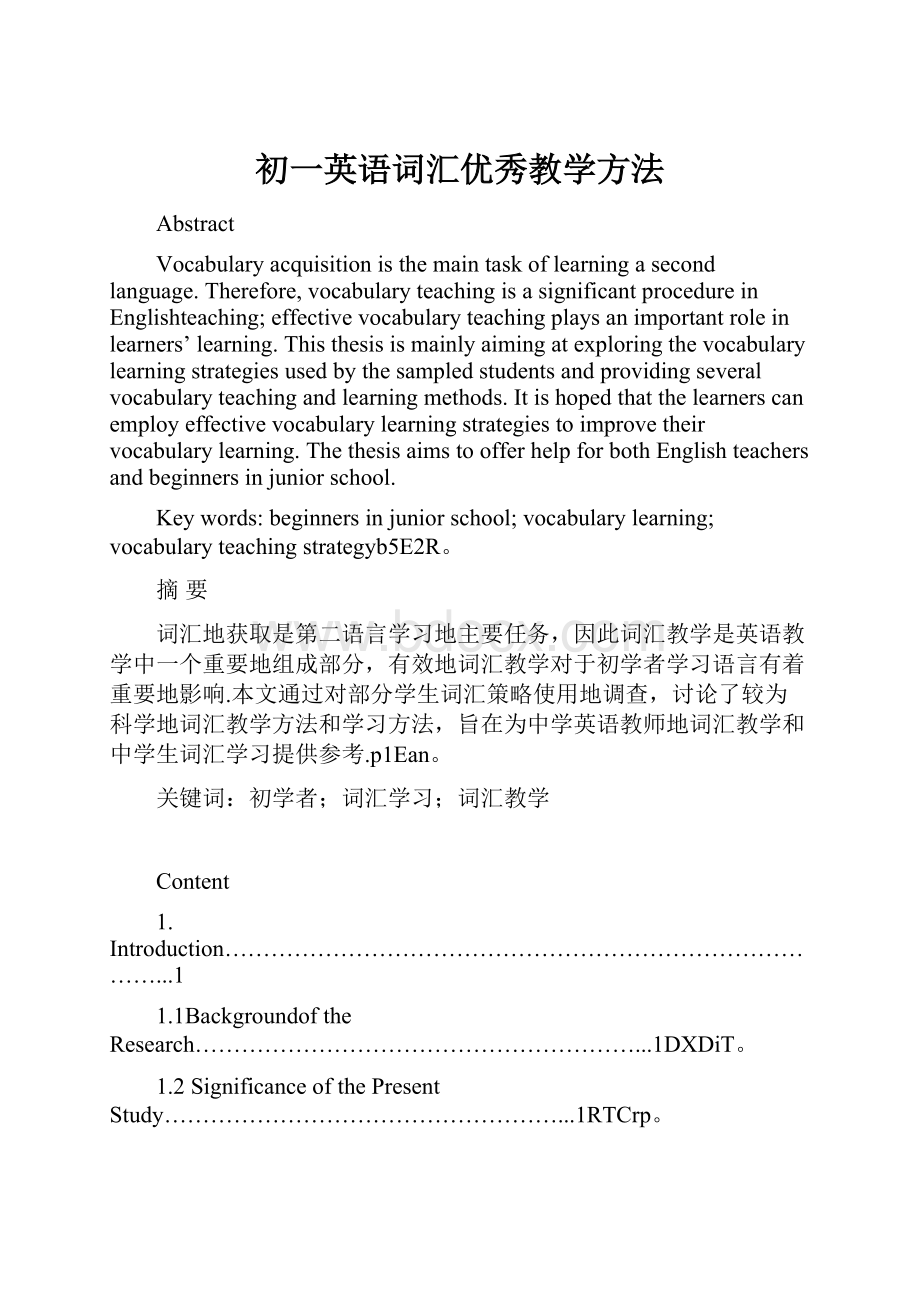初一英语词汇优秀教学方法.docx
《初一英语词汇优秀教学方法.docx》由会员分享,可在线阅读,更多相关《初一英语词汇优秀教学方法.docx(17页珍藏版)》请在冰豆网上搜索。

初一英语词汇优秀教学方法
Abstract
Vocabularyacquisitionisthemaintaskoflearningasecondlanguage.Therefore,vocabularyteachingisasignificantprocedureinEnglishteaching;effectivevocabularyteachingplaysanimportantroleinlearners’learning.Thisthesisismainlyaimingatexploringthevocabularylearningstrategiesusedbythesampledstudentsandprovidingseveralvocabularyteachingandlearningmethods.Itishopedthatthelearnerscanemployeffectivevocabularylearningstrategiestoimprovetheirvocabularylearning.ThethesisaimstoofferhelpforbothEnglishteachersandbeginnersinjuniorschool.
Keywords:
beginnersinjuniorschool;vocabularylearning;vocabularyteachingstrategyb5E2R。
摘要
词汇地获取是第二语言学习地主要任务,因此词汇教学是英语教学中一个重要地组成部分,有效地词汇教学对于初学者学习语言有着重要地影响.本文通过对部分学生词汇策略使用地调查,讨论了较为科学地词汇教学方法和学习方法,旨在为中学英语教师地词汇教学和中学生词汇学习提供参考.p1Ean。
关键词:
初学者;词汇学习;词汇教学
Content
1.Introduction………………………………………………………………………...1
1.1BackgroundoftheResearch…………………………………………………...1DXDiT。
1.2SignificanceofthePresentStudy……………………………………………...1RTCrp。
1.3AimofthePresentStudy………………………………………………………2
2.LiteratureReview………………………………………………………………….2
2.1LearningStrategies…………………………………………………………….2
2.2RelatedTheory………………………………………………………………....3
3.ResearchDesign…………………………………………………………………...3
3.1ResearchQuestion……………………………………………………………..4
3.2ResearchSubjects……………………………………………………………...4
3.3ResearchInstruments…………………………………………………………..4
3.4DataCollection………………………………………………………………...4
3.5TheResultsandAnalysisofQuestionnaire……………………………………45PCzV。
4.VocabularyTeachingStrategiesforBeginners…………………………………..8jLBHr。
4.1LearningtheListontheTextbookPage………………………………………8xHAQX。
4.1.1PronunciationandSpelling……………………………………………..9LDAYt。
4.1.2ShowingtheMeaningoftheWords…………………………………...10Zzz6Z。
4.2LearningVocabularyinContext……………………………………………...10dvzfv。
4.3CultivatingLearners’Motivation……………………………………………..12rqyn1。
4.3.1ClassifyingWords……………………………………………………..12
4.3.2ReviewingVocabularyRegularly……………………………………..13Emxvx。
5.Conclusion…………………………………………………………………………..14
References……………………………………………………………………………..16
Appendices.....................................................................................................................17SixE2。
1.Introduction
1.1BackgroundoftheResearch
Asisknown,grammar,soundandvocabularyarethethreemainelementsofalanguage.JustasWilkinssaidifthereisnovocabulary,peoplecanexpressnothing(Wilkins,1972).However,itisacommonphenomenoninjuniorschoolthatmanystudentshavenointerestsinlearningEnglishaftertheylearnEnglishforafewdaysorafewmonthsbecausetheycannotkeepnewwordsinminds.ManyEnglishbeginnerscomplainthattheyspendalargeamountoftimeinmemorizingnewwordsbutwithpoorresults.AsAllen(2002)pointsout,“Pronunciationandgrammarwereemphasized,buttherewaslittleornoemphasisonvocabulary”.Mostlanguagelearnersbeginlearninganotherlanguagebystartingwithvocabularyandthelearningofvocabularyseemstoaccompanyalearnerthroughoutthelearningprocessevenafterallthebasicgrammaticalruleshavebeenlearned(Wang,2006).What’smore,languageteachersgivelittleattentiontotechniquesforhelpingbeginnerslearnvocabulary.ThatisthemainreasonwhybeginnersfinditdifficulttolearnanewlanguageandgraduallyloseconfidenceinEnglishlearning.Therefore,vocabularyisabigobstacleinEnglishlearning.6ewMy。
1.2SignificanceofthePresentStudy
Wilkinsindicates:
“Ifthereisnogrammar,peoplecanonlyexpresssomething;butifthereisnovocabulary,peoplecanexpressnothing(Wilkins,1972:
36)”.TheacquisitionofvocabularyisanintegralpartofEnglishteachingandthesuccessofvocabularyteachinghasabearingonimprovementofstudents’Englishcompetenceforthebeginners.Especially,vocabularyisthemostfundamentalwhenlearnersbegintolearnalanguage.McCarthyindicatesthat“Nomatterhowgoodone’sgrammarisandhowbeautifulone’spronunciationis,butifonehasnoadequatevocabularytoexpressone’sownfeelingsortounderstandother’opinions,onestillcannotcommunicatewithothersinthislanguage”(1990:
140).Harmer(1990)alsopointsoutthat“Ifwecomparelanguagestructureasthesketchoflanguage,vocabularyisthethingthatprovidesimportantorganaswellasbloodandflesh.”Teachingbeginnersgoodvocabularylearningknowledgecannotonlyenablethemtomemorize,classifyandstorewordsmoreefficiently,butalsotoraisetheirstudyinterests.kavU4。
1.3AimofthePresentStudy
Inthispaper,theauthorfocusesonvocabularyteachingtechniquesandaimsatdemonstratingtheapplicationofvocabularyteachingtechniqueswiththehopethatitcanofferbothteachersandstudentssomethinguseful.y6v3A。
2.LiteratureReview
2.1LearningStrategies
Englishlearningstrategy,whichderivesfromtheterms“learningstrategy”,referstotechniquesandapproachesordeliberateactionsthatlearnersofEnglishtakeinordertofacilitatetheacquiring,storing,retrievingandmanipulatingofinformationwhilelearningEnglish(Li,2005:
80).M2ub6。
Learningstrategiesaretheparticularapproachesortechniquesthatlearnersusedtolearnasecondlanguage.Theycanbemental,forexample,usingthelinguisticorsituationalcontextstoinferthemeaningofnewword.0YujC。
2.2RelatedTheory
“Phoneticsisdefinedasthestudyofthephoneticmediumoflanguage;itisconcernedwithallthesoundsthatoccurintheworld’slanguage(He,1999)”;ThelexicologistMcCarthy(1990)echoedthatlearninggrammarwellandmasteringthesoundofaL2successfullyarefarfromenough.Communicationinacertainlanguagecanhappenonthebasisthattherearewordstoexpressawiderangeofmeaning.Schmitt(1997:
213)claimsthatcultureisanotherlearner’scharacteristicthathasbeenshowntobeimportantforvocabulary.Wangsaid:
“mechanicalpracticeisnecessaryformanyskills”(Wang,2006:
94).Soafterteaching,thelonglistsofvocabularyandtheirtranslationsintheexercisebookswefindwhatwedosomehowalwaysseemtodefymemory,andrecallthevocabularywewant,itdoesnotalwaysseemtofitcomfortablyintoourownsentence(JimScrivener,2002:
73).Awordcannotbeencounteredatleastseventimesindifferentcontextbeforeitcanbeproducedbythestudents(Wang,2006:
125).Fromtheabovetheories,itiseasytoknowthatteachingstrategiesplayanimportantroleinlanguagelearning,andanylanguagelearningneedstohavegoodteachingmethods.eUts8。
3.ResearchDesign
3.1ResearchQuestion
Theresearchmainlyfocusesononequestion,thatis,whatproblemsexistinvocabularyteaching.sQsAE。
3.2Subjects
Thisstudychoosesasampleof40studentsintwoclasses,allofwhomarefromClass96and97inGradeOneofManWanmiddleschool.GMsIa。
3.3ResearchInstruments
Inthisthesis,onlyquestionnaire(seeAppendixI)isused,whichfocusesonsurveyingbeginners’vocabularylearningstrategies.Thequestionnaireprovides15questionsforstudents;theychoose“often”,“seldom”or“no”toexpresstheirviewsaboutlearningstrategies.TIrRG。
3.4DataCollection
Atthebeginningofthestudy,theresearcherselectedtwoclassesfromjuniorschoolwith40studentsasthesubject.Then,theyarerequestedtofinishthequestionnairewithin20minutesandtorespondhonestlytoeachquestion.Becausethestudentsareallbeginners,theresearcherputtheChinesemeaningaftereachquestion(seeAppendixII).Afterstudentsfinishedansweringthequestionnaires,answerstothequestionnairewerecollectedandscored.7EqZc。
3.5TheResultsandAnalysisofQuestionnaire
Learningstrategies
Often
Seldom
No
1
Studyingwordsbyusingphonetic.
87﹪
13%
0﹪
2
UsingChinesewords,whichhavethesamesoundsasEnglishwords.
68%
13%
19%
3
Whenyoulearnwords,youonlyreadrepeatedly,butdonotwriteoronlywriteinsteadofreading.
16﹪
27%
57﹪
4
Learningwordsaccordingtosimilarpronunciationorspelling.
26%
19%
55%
5
UsingwordsliststomemorizewordsmeaningonebyonetoChinese.
61﹪
16%
23%
6
UsingnewEnglishwordsinasentence.
33%
27%
40%
7
Learningwordsintext.
39%
30%
31%
8
Usingnewwordsintopractice.(Communication,dialogue,makingstory.)
17%
10%
73%
9
Makingaplan,andaskingyourselftolearncertainwordsperdayorweek.
41%
34%
25%
10
Groupingwords,forexample,youcanputthecolorwordstogethertostudythem.
27﹪
11%
62%
11
Usingkeywordstoreviewvocabulary.(family—mother,father)
14﹪
22%
64%
12
Usinganotebooktowritedownthewordsyouarenotfamiliarwith.
37﹪
10%
53%
13
Usingsynonymsandantonyms
22﹪
27%
51%
14
Learningwordsaslongasyouhavetime.
56%
30%
14%
15
YouhaveconfidenceinEnglishvocabularylearning.
33﹪
40%
27%
Fromthequestionnaireabove,wewaneasilyfindthatEnglishbeginnersdonothavetherealizationsthattheyshouldusestrategiestolearnvocabulary.Accordingtothequestionnaire,therearethreeproblemsinvocabularyteaching:
lzq7I。
(1)Fromquestion1to4,wecanseethatbeginnersdonotknowwhatstrategyis,andthemethodstheychoseareverysimple,usuallymostofwhicharesometraditionalways,suchasreadingandwritingbyrepetition.What’smore,beginnersevenchooseChinesewordsinsteadofEnglishsound,andtheytrytheirbesttofindasimilarChinesesoundtoreplacethewordspronunciation,sincetheyareafraidofforgettingthepronunciationofthewords.Beingtaughtinthisway,beginnersmightloseinterestsinEnglishlearning.zvpge。
(2)Fromquestion5to8,itappearsthatmoststudentsadoptthetraditionalstrategiestolearnvocabularymeaning,thatis,learningwordsonebyonetoChinese.Someinteresti